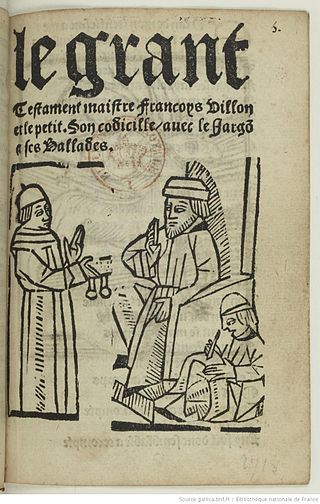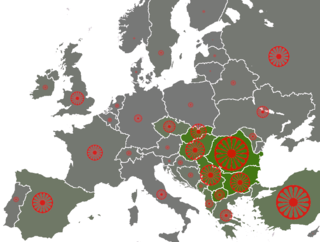
The Romani, colloquially known as the Roma, are an Indo-Aryan ethnic group and traditionally nomadic itinerants. They live in Europe and Anatolia, and have diaspora populations located worldwide with significant concentrations in the Americas.
Romani is an Indo-Aryan macrolanguage of the Romani communities. According to Ethnologue, seven varieties of Romani are divergent enough to be considered languages of their own. The largest of these are Vlax Romani, Balkan Romani (600,000), and Sinte Romani (300,000). Some Romani communities speak mixed languages based on the surrounding language with retained Romani-derived vocabulary – these are known by linguists as Para-Romani varieties, rather than dialects of the Romani language itself.

Romani music is the music of the Romani people who have their origins in northern India but today live mostly in Europe.

The Sinti are a subgroup of Romani people mostly found in Germany and Central Europe that number around 200,000 people. They were traditionally itinerant, but today only a small percentage of Sinti remain unsettled. In earlier times, they frequently lived on the outskirts of communities. The Sinti of Central Europe are closely related to the group known as Manouche in France. They speak the Sinti-Manouche variety of Romani, which exhibits strong German influence. The origin of the Sinti people, as with the broader Romani people, lies generally in the Indian subcontinent; while people from the western Indian subcontinent's region of Sindh were mentioned in 1100 by the Arab chronicler Meidani, it is unclear if the Sindhi people are the ancestors of modern-day Sinti, though what is clear is that the Sinti, as with other Romani people, generally originate in the northern Indian subcontinent.
Pikey is a slang term, which is pejorative and considered by many to be a slur. It is used mainly in the United Kingdom and in Ireland - north and south - to refer to people who are of the Traveller community, a set of ethno-cultural groups found primarily in Great Britain and Ireland. It is also used against Romanichal Travellers, Welsh Kale, Scottish Lowland Travellers, Scottish Highland Travellers, and Funfair Travellers.

A shiv, also chiv, schiv, shivvie, or shank, is a handcrafted bladed-weapon resembling a knife that is commonly associated with prison inmates.
"Chav", also "charver", "scally" and "roadman" in parts of England, is a British term, usually used in a pejorative way. The term is used to describe an anti-social lower-class youth dressed in sportswear. "Chavette" is a related term referring to female chavs, and the adjectives "chavvy", "chavvish", and "chavtastic" are used to describe things associated with chavs, such as fashion, slang, etc. In other countries like Ireland, "Skanger" is used in a similar manner. In Canada, in the province of British Columbia they're known as "Surrey jacks". In Ontario, the term is "hoodman", an equivalent of the term "roadman" used in England. In Newfoundland, "skeet" is used in a similar way, while in Australia, "eshay" or "adlay" is used.
Boyash or Bayash refers to a Romani ethnic group living in Romania, southern Hungary, northeastern and northwestern Croatia, western Vojvodina, Slovakia, the Balkans, but also in the Americas. Alternative names are Rudari (Ludari), Lingurari and Zlătari.
Angloromani or Anglo-Romani is a mixed language of Indo European origin involving the presence of Romani vocabulary and syntax in the English used by descendants of Romanichal Travellers in the United Kingdom, Australia, Canada, New Zealand, United States, and South Africa.

Thieves' cant is a cant, cryptolect, or argot which was formerly used by thieves, beggars, and hustlers of various kinds in Great Britain and to a lesser extent in other English-speaking countries. It is now mostly obsolete and used in literature and fantasy role-playing, although individual terms continue to be used in the criminal subcultures of Britain and the United States.
Caló is a language spoken by the Spanish and Portuguese Romani. It is a mixed language based on Romance grammar, with an adstratum of Romani lexical items through language shift by the Romani community. It is often used as an argot, a secret language for discreet communication amongst Iberian Romani. Catalan, Galician, Portuguese, and Spanish caló are closely related varieties that share a common root.

Romanichal Travellers are a Romani subgroup within the United Kingdom and other parts of the English-speaking world. There are an estimated 200,000 Romani in the United Kingdom; almost all live in England. Most Romanichal speak Angloromani, a mixed language that blends Romani vocabulary with English syntax.
The Romani people, also referred to as Roma, Sinti or Kale, depending on the sub-group, are an Indo-Aryan ethnic group which primarily lives in Europe. The Romani may have migrated from what is the modern Indian state of Rajasthan, migrating to the northwest around 250 BCE. Their subsequent westward migration, possibly in waves, is now believed to have occurred beginning in about 500 CE. It has also been suggested that emigration from India may have taken place in the context of the raids by Mahmud of Ghazni. As these soldiers were defeated, they were moved west with their families into the Byzantine Empire. The author Ralph Lilley Turner theorised a central Indian origin of Romani followed by a migration to Northwest India as it shares a number of ancient isoglosses with Central Indo-Aryan languages in relation to realization of some sounds of Old Indo-Aryan. This is lent further credence by its sharing exactly the same pattern of northwestern languages such as Kashmiri and Shina through the adoption of oblique enclitic pronouns as person markers. The overall morphology suggests that Romani participated in some of the significant developments leading toward the emergence of New Indo-Aryan languages, thus indicating that the proto-Romani did not leave the Indian subcontinent until late in the second half of the first millennium.
The Norwegian and Swedish Romanisæl Travellers are a group or branch of the Romani people who have been resident in Norway and Sweden for some 500 years. The estimated number of Romanisael Travellers in Sweden is 65,000, while in Norway, the number is probably about 10,000.
In Romani culture, a gadjo (masculine) or gadji (feminine) is a person who has no Romanipen. This usually corresponds to not being an ethnic Romani, but it can also be an ethnic Romani who does not live within Romani culture. It is often used by Romanies to address or denote outsider neighbors living within or very near their community.

The Roma people have several distinct populations, the largest being the Roma and the Iberian Calé or Caló, who reached Anatolia and the Balkans in the early 12th century, from a migration out of the Indian subcontinent beginning about 1st century – 2nd century AD. They settled in the areas of present-day Turkey, Greece, Serbia, Romania, Croatia, Moldova, Bulgaria, North Macedonia, Hungary, Albania, Kosovo, Bosnia and Herzegovina, Czech Republic, Slovenia and Slovakia, by order of volume, and Spain. From the Balkans, they migrated throughout Europe and, in the nineteenth and later centuries, to the Americas. The Roma population in the United States is estimated at more than one million.
British slang is English-language slang originating from and used in the United Kingdom and also used to a limited extent in Anglophone countries such as Ireland, South Africa, Australia, Canada, and New Zealand, especially by British expatriates. It is also used in the United States to a limited extent. Slang is informal language sometimes peculiar to a particular social class or group and its use in Britain dates back to before the 15th century. The language of slang, in common with the English language, is changing all the time; new words and phrases are being added and some are used so frequently by so many, they almost become mainstream.
Scottish Travellers, or the people in Scotland loosely termed Romani persons or travellers, consist of a number of diverse, unrelated communities that speak a variety of different languages and dialects that pertain to distinct customs, histories, and traditions.

The Romani people are also known by a variety of other names; in English as gypsies or gipsies, and Roma; in Greek as γύφτοι (gíftoi) or τσιγγάνοι (tsiggánoi), in Central and Eastern Europe as Tsingani ; in France as gitans besides the dated terms bohémiens and manouches; in Italy as rom and sinti besides the dated terms zingari, zigani, and gitani; in Spain as gitanos; and in Portugal as ciganos.
Dick is a common English slang word for the human penis. It is also used by extension for a variety of slang purposes, generally considered vulgar, including: as a verb to describe sexual activity; and as a pejorative term for individuals who are considered to be rude, abrasive, inconsiderate, or otherwise contemptible. In this context, it can be used interchangeably with jerk, and can also be used as a verb to describe rude or deceitful actions. Variants include dickhead, which literally refers to the glans. The offensiveness of the word dick is complicated by the continued use of the word in inoffensive contexts, including as both a given name and a surname, the popular British dessert spotted dick, the classic novel Moby-Dick, the Dick and Jane series of children's books, and the American retailer Dick's Sporting Goods. Uses such as these have provided a basis for comedy writers to exploit this juxtaposition through double entendre.







